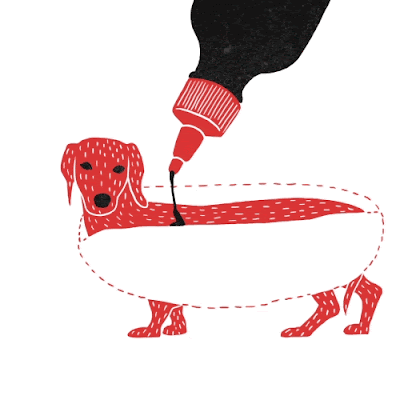Your English Digest 英語每周一文。英文裡的中文外來字為何那麼少?Why so little Chinese in English?
不能不曉得的英文外來字
許多我們習以為常的英文字,其實是外來字loan words。大家可能不曉得,英文的番茄醬ketchup一字,可能源字中國福建一帶的方言(據說跟醃漬魚罐頭的番茄汁有關…)。英文的香蕉,banana則是源自西非。另外,巫毒voodoo是非洲語。殭屍一字zombie也是西非土語。更有趣的是可樂這個字cola,也跟非洲話扯得上關係喔。
我們常說的糖果candy一字,其實來自阿拉伯文。Coffee咖啡與木乃伊mummy,也都是阿拉伯字。氣球balloon 是來自於法語。另外同樣是法語外來字的還有unicorn獨角獸,跟壞人villain。至於德文,大家都曉得的幼稚園這個字kindergarten其實是德文。再來看看curry咖哩這個字,如果跟你說這個字是印度文,你一定不覺得奇怪。滑雪ski來自於挪威。那泡菜呢?Kimchi這個韓文,早就已經是英美人士都熟悉的字眼了。
這篇經濟學人文章,探討了中文一直無法真正成為英語常用字彙的原因。其實有許多字眼,納入英語字典已經有一段時間了,可是一般美國民眾,真正會使用的字彙可說是少之又少。我之前在TIME雜誌裡面看過gung ho(原意是中文的工合,現在則衍生為賣力、起勁或是熱心的意思) 或是kowtow(磕頭),但是除了像時代雜誌這類的菁英文摘,中國字幾乎沒幾個字能真正進入美國人的生活中。作者認為,隨著中國的迅速崛起,西方人對這個東方古老大國的興趣與日俱增,說不定日後,英語中會出現更多的中文外來字。我個人對這一點也持肯定態度。這篇文章最後還有教練整理出來的一個列表,提供大家參考。
by
R.L.G. | NEW YORK
From the
Economist
Language borrowing
Language borrowing
Why so little Chinese in English?
ON
TWITTER, a friend asked "Twenty years from now, how many Chinese words
will be common parlance常見說法 in English?" I
replied that we've already had 35 years since Deng Xiaoping鄧小平 began opening China's economy, resulting in its stratospheric rise(地位的)躍升/崛起—but
almost no recent Chinese borrowings in English.
Many
experts are willing to explain China to curious (and anxious) Westerners. And
yet I can't think of even one Chinese word or phrase that has become
"common parlance in English" recently. The only word that comes close
might be guanxi關係, the personal connections and
relationships critical to getting things done in China. Plenty of
articles can be found discussing the importance of guanxi, but the word isn't
"common in English" by any stretch無論/任憑怎樣.
Most
Chinese words now part of English show, in their spelling and meaning, to have
been borrowed a long time ago, often from non-Mandarin Chinese varieties非北京話的多元方言
like Cantonese廣東話. Kowtow磕頭, gung ho共和 and to shanghai詐騙或是綁架are now impeccably無可挑剔的 English words we use
with no reference to China itself. Kung fu功夫, tai chi太極, feng shui風水and the like諸如此類的 are Chinese concepts and practices
Westerners are aware of. And of course, bok choy白菜, chow mein炒麵 and others are merely Chinese foods
that Westerners eat; I would say we borrowed the foods, and their Chinese names
merely hitched a
ride搭順風車 into English.
Given
China's rocket-ride to prominence迅速的崛起(用搭火箭形容非常快速),
why so little borrowing? We import 進口words from other
languages that are hard for English speakers to pronounce. We borrow from
languages with other writing systems (Yiddish意第緒語, Russian, Arabic). We
borrow from culturally distant places (India, Japan). We borrow verbs (kowtow)
and nouns (tsunami) and exclamations (banzai! oy!). We borrow concrete things
(sushi) and abstract ones (Schadenfreude幸災樂禍, ennui無聊倦怠). We borrow not only from friends but from rivals and enemies敵人 (flak攻擊/抨擊等非常不好的狀況)from German in the Second World War, samizdat地下出版 from Russian during the cold war美蘇的冷戰時期,
too many words to count from French during the long Anglo-French rivalry英法對立).
So
perhaps China's rise is simply too new, and we just need another 20 years or
so.
We've
seen a similar film before. Japan's sudden opening to the world, a world war,
and then forty years of an economic boom經濟榮景 put quite a few Japanese
words and concepts into the Anglophone以英文為母語的人 mind:
kamikaze神風特攻隊, futon沙發床,
haiku, (日本)三行俳句詩kabuki歌舞伎,
origami摺紙藝術,
karaoke卡拉OK,
tycoon大亨, tsunami海嘯,
jiu-jitsu柔術, zen禪and
honcho老闆are
all common English words that nowadays can be used without any reference to
Japan. Add to that the more specifically Japanese phenomena日本現象 well known to the English-speaking
world: karate空手道, judo柔道,
sumo日本摔角bonsai盆栽,manga漫畫,
pachinko柏青哥,samurai武士, shogun幕府將軍,
noh日本古典劇 – 能劇and kimono和服, say, not to mention foods from the
bland (tofu豆腐) to the potentially fatal (fugu河豚). Of course, the Japanese borrowed some of these words
from the Chinese, like zen (modern Mandarin chán) and tofu (dòufu). But English
borrowed them from the Japanese, not the Chinese.
It
seems likely English will borrow from the Chinese, too, as trade, cultural, and
personal connections between China and the West grow. And perhaps there's an elusive "cool" element無法捉摸的超酷元素, a
cultural cachet文化特質(蓋章認證)
in
the West that China has yet to attain. If China gets there one day, this would
certainly boost China's linguistic exports.如果有一天,中國也能在西方語言文化中占一席之地,中文滲透入英語的可能性將大為提高Whether future Chinese
borrowings will be new edibles新的食物名稱, cultural items文化的專有名詞 or even philosophical terms哲學專有名詞 will depend on China's
development and how the West responds.
英語裡的外來字一覽表(中文篇)
Chinese Loan Words in the English Language
更多英語的中文外來字,請參考
http://en.wikipedia.org/wiki/List_of_English_words_of_Chinese_origin
English
|
Chinese Source
|
Literal Meaning
|
Remarks
|
Bok choy
|
白菜
|
White vegetable
|
(Via Cantonese bok choi)
|
Bonsai
|
盆栽
|
Bowl plant
|
(Via Japanese)
|
Cheongsam
|
長衫
|
Long dress
|
(Via Cantonese cheongsam) The same
dress is known as a qipao (旗袍) in Mandarin
|
秦
|
Name of the Qin dynasty
|
The West appears to have named
|
|
Chop chop
|
急
|
Hurried
|
(Via Cantonese gap)
|
Chop suey
|
雜碎
|
Miscellaneous bits
|
(Via Cantonese jaap seui)
|
Chow
|
炒
|
Fried (food)
|
|
Chow chow
|
狗狗
|
Doggie
|
A dog breed
|
Chow mein
|
炒麵
|
Fried noodle
|
(Via Cantonese chaau mein)
|
Coolie
|
苦力
|
Bitter power
|
|
Cumshaw
|
感謝
|
Grateful thanks
|
(Via
|
Dimsum
|
點心
|
Pointing to the heart
|
(Via Cantonese dim sum)
|
Feng shui
|
風水
|
Wind and water
|
|
Gingkgo
|
銀杏
|
(Via Japanese)
|
|
Ginseng
|
人蔘
|
(Via Cantonese yan sam)
|
|
Gung ho
|
共和
|
Work together in harmony
|
From the motto of some US Marine forces in
|
日本
|
Source of the sun
|
||
J-particle
|
丁
|
(A surname)
|
The J-particle is a subatomic particle
named after its discoverer, Samuel C.C. Ting (丁肇中).
The letter J resembles the shape of Ting's last name (丁).
|
Judo
|
柔道
|
Gentle Way
|
(Via Japanese)
|
Junk
|
船
|
Boat
|
(Via Malay)
|
Kanji
|
漢字
|
Chinese characters
|
(Via Japanese)
|
Kaolin
|
高嶺
|
Tall mountain peak
|
Name of area of
|
Ketchup
|
茄汁
|
Tomato sauce
|
(Via Cantonese ke jap). Most
dictionaries actually list the source of the word as being a Chinese or Malay
word meaning fish sauce. They ignore the more direct route: the Cantonese
word which sounds like ketchup and which actually means tomato sauce. Duh.
(In Mandarin, ketchup is called 番茄醬)
|
Kowtow
|
叩頭
|
Knock head
|
|
Kumquat
|
金桔
|
Golden orange
|
(Via Cantonese gam gwat)
|
Kungfu
|
功夫
|
||
Lose face
|
丟臉
|
Lose face
|
The literal translation of the Chinese phrase
meaning humiliation
|
Loquat
|
枇杷
|
||
Lychee
|
荔枝
|
(Via Cantonese lai ji)
|
|
Mahjong
|
麻將
|
||
Oolong
|
烏龍
|
Black Dragon
|
A type of tea
|
Pekoe
|
白毫
|
White down feather
|
(Via
|
Pinyin
|
拼音
|
Sound spelling
|
|
Ricksha
|
力車
|
(Human-) Powered vehicle
|
(Via Japanese) Short for 人力車
or human-powered vehicle
|
Sampan
|
舢舨
|
||
上海
|
Northern Sea
|
Used in English as a verb meaning to abduct
(Presumably from prior practice by San Francisco boat captains of kidnapping
men in order to press them into service in Shanghai-bound boats.)
|
|
Shaman
|
沙門
|
Sand door
|
|
Shaolin
|
少林
|
Small forest
|
|
Shinto
|
神道
|
Saintly way
|
|
Silk
|
絲
|
Silk
|
|
Shogun
|
將軍
|
Army General
|
|
Soy (sauce)
|
醬油
|
(Via Japanese shoyu)
|
|
Tai chi
|
太極
|
Ultimate
|
|
Tai chi chuan
|
太極拳
|
Ultimate boxing
|
|
Taipan
|
大班
|
Big boss
|
(Via Cantonese daai baan)
|
Tangram
|
湯
+ gram
|
Chinese picture
|
Tang, the name of one of
|
Tao (Dao)
|
道
|
Way
|
|
Tea
|
茶
|
Tea
|
(Via
|
Tofu
|
豆腐
|
Bean curd
|
|
Tycoon
|
大官
|
Great official
|
(Via Japanese)
|
Typhoon
|
颱風
|
Hurricane
|
|
Wok
|
鑊
|
Cauldron
|
(Via Cantonese wok)
|
Wonton
|
餛飩
|
(Via Cantonese wan tan)
|
|
Wushu
|
武術
|
||
Yamen
|
衙門
|
Official door
|
|
Yen
|
癮
|
Craving
|
To yearn
|
Yen
|
圓
|
Monetary unit
|
(Via Japanese) Japanese money
|
Yin Yang
|
陰陽
|











哇!好詳細,感謝教練,給妳100分!!
回覆刪除哈哈謝謝師兄。感謝捧場。
刪除